- Home
- »
- Next Generation Technologies
- »
-
System Integration Market Size, Share & Trends Report 2030GVR Report cover
![System Integration Market Size, Share & Trends Report]()
System Integration Market (2024 - 2030) Size, Share & Trends Analysis Report By Services (Infrastructure Integration, Application Integration, Consulting), By Enterprise Size, By End-use, By Region, And Segment Forecasts
- Report ID: 978-1-68038-310-2
- Number of Report Pages: 120
- Format: PDF
- Historical Range: 2018 - 2023
- Forecast Period: 2024 - 2030
- Industry: Technology
- Report Summary
- Table of Contents
- Interactive Charts
- Methodology
- Download FREE Sample
-
Download Sample Report
System Integration Market Size & Trends
The global system integration market size was valued at USD 385.95 billion in 2023 and is expected to grow at a CAGR of 13.8% from 2024 to 2030. Increasing public and private investments in system integration solutions to enhance Information Technology (IT) infrastructure are driving the growth of the system integration market. The increasing need for eradicating the diversity and heterogeneity of vital applications used in infrastructure is expected to drive the system integration market over the forecast period. The outbreak of COVID-19 had an adverse impact on the system integration industry across the globe. However, from early 2021 onwards, rapid digitization and a rise in public & private investments in infrastructure development boosted the demand for project management and system integration solutions.
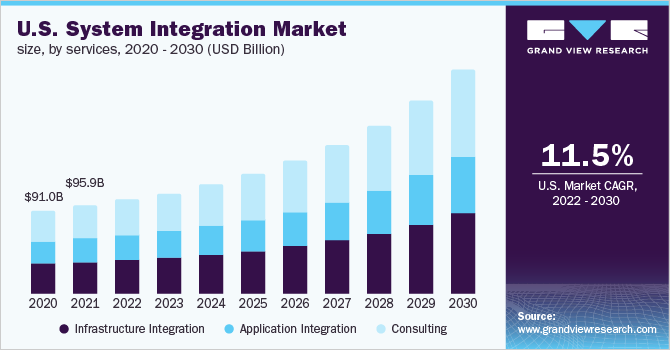
System integration brings disparate processes together, enabling smarter organizational operations. Organizations are recognizing the importance of system integration as enterprise complexity impacts their profitability and competitive edge. System integration technologies provide enterprises with cost-effective, centralized, and integrated solutions for their IT infrastructure. The increasing number of users of information technology is one of the key factors driving the growth of the system integration market. According to the U.S. Bureau of Labor Statistics, employment in computer-related occupations is expected to increase by 15% by 2031. Therefore, system integration is gaining popularity across various industries and sectors, including defense, marine systems, telecommunications and IT, aviation, oil & gas, banking, and healthcare.
Various international government-authorized organizations are taking supportive initiatives to increase cross-border investments and strengthen global business operations. Global organizations, such as the World Trade Organization (WTO), the United Nations Organization (UNO), and the World Economic Forum (WEF), are launching digital infrastructure solutions to attract foreign investment. For instance, in May 2022, the World Economic Forum (WEF) collaborated with the Digital Cooperation Organization (DCO) to commence the digital FDI program to attract public & private investments in developing countries and emerging markets. The company is planning to establish its first Digital FDI system in Nigeria. These initiatives by international organizations are expected to propel the demand for system integration solutions to improve the payment system and implement a flexible system framework, allowing investors to expand their business in the respective regions.
The companies operating in the system integration market are partnering with technology providers to improve their product portfolio. For instance, in October 2022, Infosys Limited announced the collaboration with CIRCOR International, a leading provider of control products and services for the industrial and aerospace & defense industries, to transform its IT infrastructure, user support applications, and service desk. With strong system integration and automation capabilities, Infosys would transform CIRCOR’s IT services by deploying Service Level Agreements (SLA)-managed IT services and bring agility into business operations to modernize the cloud landscapes and local data centers.
The challenges faced in the system integration market include difficulty integrating legacy systems with emerging technologies and a lack of technologically skilled personnel to operate sophisticated equipment. Furthermore, system integration necessitates a standardized network infrastructure for efficient operation. The lack of network infrastructure has resulted in the deferred demand for system integration. Moreover, significant growth in the app economy has resulted in a rapid increase in disparate applications deployed across various environments, such as cloud and on-premise. These factors are expected to restrict industry growth over the forecast period.
Market Concentration & Characteristics
System integration facilitates the connection of various subsystems within an organization. Thus, various businesses are looking for system integration tools that can enhance the quality, efficiency, and productivity of their operations. Thus, system integrators in the market are taking significant steps to drive innovation and product enhancements. For instance, in April 2023, Microsoft Corporation, a technology software, solution, and service provider, announced a strategic collaboration with a software development company to develop and integrate generative AI across healthcare by integrating the power and scale of Microsoft’s Azure OpenAI Service1 with Epic’s advanced electronic health record software. This partnership aimed to create a co-innovation ecosystem focused on providing a comprehensive offering of generative AI-powered solutions that can enhance patient care, increase productivity, and strengthen the financial integrity of global health systems.
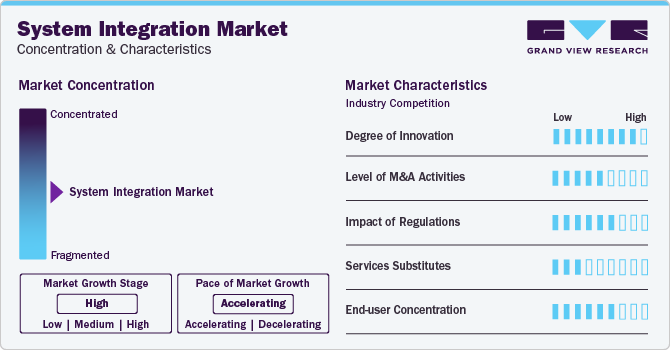
The system integration services market is witnessing a high level of merger and acquisition initiatives by various leading and emerging players. For instance, in December 2023, MDS System Integration, a part of MDS Group, announced the acquisition of a majority stake in the Smpl ID, a Middle East & Africa (MEA) based identity and access management (IAM) solution and service provider. Based on this development, MDS aims to minimize intrusions, enhance security capabilities, and ensure secure integration services for its existing and potential system integration customers in the MEA region.
The market is also subject to rules and regulations set by international, regional, and country-level regulatory bodies. Various international regulatory bodies have drafted regulations to ensure the safe and secure integration of software and technologies, thereby preventing the misuse of consumer data and protecting it from unauthorized users. Market players are focusing on obtaining various certifications, such as EU-U.S. Privacy Shield, TRUSTe Certified Privacy, and Swiss-U.S. Privacy Shield, for regulatory and security compliance.
The conventional method adopted by businesses is a direct substitute for the system integration services. However, the lack of efficiency and outdated systems, coupled with growing trends such as Industry 4.0, digitization, and rapid technological innovations, is creating a favorable demand for robust technology integration systems among all the major industries.
The system integrators serve a broad spectrum of industry verticals, including IT & telecom, defense & security, BFSI, oil & gas, healthcare, transportation, retail, and others. For instance, in April 2023, IBM Corporation, a global system integration service company, announced a strategic partnership with Riyadh Air, an airline company, based on while IBM Consulting, a consulting arm of IBM Corporation, will work as a lead systems integrator to support design, develop, and orchestrating the technologies that can help Riyadh Air digitally native airline operations which can ensure seamless and hassle-free travel experiences. Thus, the following factors are expected to drive the growth of the system integration services market.
Services Insights
The infrastructure integration segment accounted for a market share of over 38% in 2023. Infrastructure integration is expected to witness healthy growth over the next few years, driven by the increasing need to provide a unified IT infrastructure that is resilient, agile, and secure, while also keeping a close eye on costs. In addition, the complex business environment has prompted enterprises to evolve and adapt to new IT infrastructures continually. This is expected to drive demand for infrastructure integration over the coming years. Various market players are collaborating with engineering services providers the develop effective infrastructure integration solutions for smart city projects. These players are outsourcing their infrastructure integration testing services to improve the overall system performance.
The consulting segment is expected to expand at a significant CAGR of 15.2%. This can be attributed to the rising need for enterprises to assist users in designing their Business Continuity & Disaster Recovery Planning (BCP & DRP) as well as conducting rehearsals for effective and efficient workflow. The system integration solution provider offers consulting services to help clients effectively integrate the digital services and modernize their IT systems. For instance, in October 2022, Kyndryl Holdings, Inc., an IT infrastructure industry player and to expand service provider, launched Kyndryl Consult, consulting services which their services & solutions help its existing & new customers in complex technology integrations in their business models and accelerate their business outcomes.
End-use Insights
The Banking, Financial Services, and Insurance (BFSI) segment held a market share of over 15.8% in 2023. System integration enables safe, quick, and seamless banking operations by building an IT infrastructure that addresses the critical requirements of the banking sector. Various companies operating in the BFSI sector collaborate with system integrators to expand their banking services & enrich their brand representation, thereby driving the system integration demand in the BFSI sector. Furthermore, the proliferation of neo-banking services, the rise of fintech startups, the significant demand for banking-as-a-service (BaaS), and the shifting focus of various governments toward the digital economy are vital factors accelerating the growth of the system integration market in the BFSI sector.
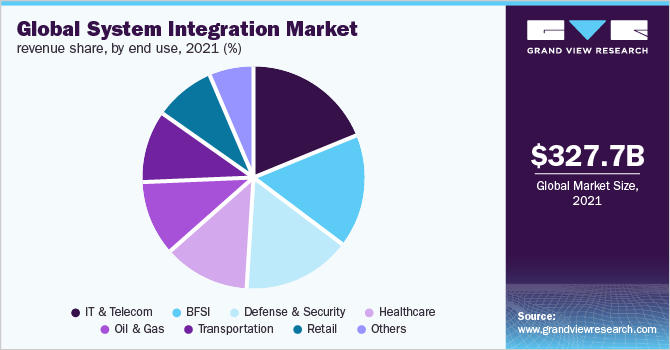
The IT & telecom segment is anticipated to grow at a significant CAGR of 16.8% over the forecast period. The surge in expenditure on system integration solutions by key players has enhanced the management of IT infrastructure and considerably reduced redundancies. Furthermore, system integration aids the integration of hardware and software solutions sourced from a large pool of IT players. The increasing demand for telecommunications systems to enhance network coverage is prompting various telecom companies to enhance their business operations. For instance, in February 2022, Cisco Systems, Inc. signed an agreement with Rakuten Mobile, Inc.’s subsidiary Rakuten Symphony, Inc. to develop infrastructure solutions for Open RAN technology-powered 45G/5G mobile networks. Cisco Systems, Inc. would leverage its expertise in cloud computing to develop mobile networks equipped with cloud-native Open Radio Access Network (ORAN) technology, helping the company enhance its brand value in the IT and telecom sectors.
Regional Insights
North America held a market share of over 35% in 2023, driven by the increasing use of IoT in industrial automation and the growing adoption of cloud-based services among large organizations. Moreover, the BFSI sector in the region has adopted modern technology, presenting significant growth prospects for the system integration market in North America. To this end, banks are taking considerable care to ensure they meet every client’s requirement. For instance, according to Bank of America, 70% of its customers use digital services for their financial needs. It can help the bank to develop its client base and stay competitive in the market. The migration of organizations to these services will increase the demand for system integration services in the region during the forecast period.
Europe System Integration Market Trends
The European system integration market was estimated to be valued at USD 101.41 billion in 2023. The growth of the system integration market in Europe can be attributed to increased partnership/collaboration activities, which have enabled the companies operating in the European region to have access to advanced system integration solutions. For instance, in December 2023, Infosys and LKQ Europe, a European distributor of automobile aftermarket components, established a five-year cooperation. Following LKQ's recent strategic acquisitions, the Bengaluru-based strategic partnership seeks to improve product availability, expedite end-to-end delivery, and optimize business operations. When it comes to standardizing and integrating systems and procedures for effectiveness and advantages, Infosys will set the standard.
U.K. System Integration Market Trends
The U.K. system integration market was estimated to grow at a CAGR of over 15% over the forecast period. The growth of the system integration market in the U.K. can be attributed to factors such as expansion activities carried out by several companies in the system integration market. For instance, in October 2023, NeoDyne signaled its growth and advancement in the U.K. by opening a new headquarters. A SolutionsPT partner is establishing a presence in Chesterfield to serve its existing clients and leverage the region's engineering talent. NeoDyne, an AVEVA Endorsed Systems Integrator and a dependable partner of SolutionsPT, AVEVA Select Partner Ireland & U.K., has expanded with its new U.K. headquarters situated in Chesterfield, Derbyshire.
Germany System Integration Market Trends
The Germany system integration market was estimated to hold a market share of around 33.2% in 2023 in the European system integration market. The growth of the system integration market in Germany can be attributed to increasing investment in the country aimed at the creation of a technological industrial complex. For instance, in July 2023, Siemens announced plans to establish a blueprint for an industrial metaverse in the Nuremberg metropolitan area and invest ~USD 1.10 billion (EUR 1 billion) in Germany. Siemens is positioning its base in Erlangen as the center of global technological activities for the industrial metaverse and as a hub for research and development. Siemens will be able to spur innovation, strengthen its resilience, and accelerate its overall growth with these actions.
France System Integration Market Trends
The France system integration market was estimated to grow at a CAGR of 14.3% over the forecast period. The growth of the system integration market in France can be attributed to initiatives by the government, which has been pushing the growth of the market in the country. For instance, in September 2023, the French government proposed the mandates for B2B e-invoicing. The new e-Invoicing platform is a joint project of the Direction Générale des Finances Publiques (DGFIP), the French Directorate of Public Finances, and the Agence pour l'Informatique Financière de l'État (AIFE), the state financial information agency. At this point, the DGFIP and AIFE's recommended revised schedule should still be regarded as preliminary. It will be verified once the government announces the 2024 Finance Act, at the latest, in October 2023.
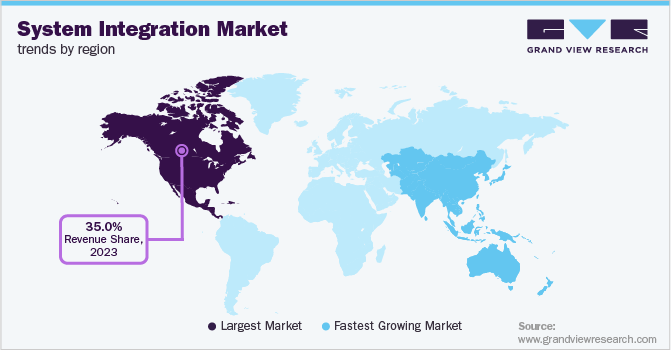
Asia Pacific System Integration Market Trends
The Asia Pacific system integration market is anticipated to rise as the fastest developing regional market at a CAGR of 16.2%, owing to the rapid growth of the Asian economies, resulting in increasing investments in system integration. Furthermore, there is a growing demand for network integration services due to the expanding IT & telecom sector in India, Singapore, South Korea, and China. Key market players in the region are forming strategic partnerships for business development, which is expected to drive industry growth. For instance, in March 2022, Tech Mahindra Limited announced a partnership with Bharti Airtel, a telecommunication service provider, to build innovative solutions for India’s economy. With this partnership, both companies bring enterprise-grade private networks, focusing on Ariel’s integrated connectivity portfolio of 5G mobile networks, SDWAN, fiber, and IoT, along with Tech Mahindra’s system integration capabilities.
China System Integration Market Trends
China's system integration market was estimated to be valued at USD 38.39 billion in 2023. The growth of the system integration market in China can be attributed to factors such as increasing investment in the country for various projects. For instance, in February 2023, GCL System Integration Technologies, a Chinese firm, declared that it would invest around ¥2 billion (~$292 million) to construct a high-efficiency solar module factory capable of producing 12 GW of electricity annually. A combination of money from self-raised funds, commissions from government building projects, loans from financial institutions, and project industry funds will be used to finance the project.
India System Integration Market Trends
The India system integration market was expected to register a CAGR of over 17% over the forecast period. The government of India has taken action to support the industrial sector and increase both local and international investment in the country, which has contributed to the expansion of the system integration market. A few of these are the Phased Manufacturing Programme (PMP), the introduction of the Goods and Services Tax, the reduction of corporate tax, the reforms of the FDI policy, the steps taken to lessen the burden of compliance, the introduction of interventions to make doing business easier, and the policy measures to increase domestic manufacturing through public procurement orders.
Japan System Integration Market Trends
Japan's system integration market was estimated to be USD 28.67 billion in 2023. The growth of the system integration market in India can be attributed to factors such as increasing strategic initiatives undertaken by the system integration solution providers in the country. For instance, in September 2023, Boomi, a pioneer in intelligent connection and automation, today announced a new alliance with Sazae Japan, Inc. ("Sazae"), a well-known supplier of consulting services for digital transformation. Boomi is Sazae's first partner in Japan for an integration platform as a service (iPaaS). Sazae Pty Ltd's Japanese affiliate is well-established in Singapore, Vietnam, and Japan. Sazae plans to integrate the user-friendly, low-code Boomi platform into its extensive range of upstream IT consulting services for various sectors of the economy.
Middle East & Africa System Integration Market Trends
The Middle East & Africa system integration market held a market share of around 4% in the global system integration market in 2023. The growth of the system integration market in the Middle East & Africa can be attributed to factors such as the increasing number of strategic initiatives in the region, which help enable the clients in the region to have access to advanced system integration solutions. For instance, in June 2023, GitLab was named as a focal partner in a Strategic Partnership deal released by MDS System Integration Group. As the firm expands, MDS SI and its affiliates aim to provide solutions that enhance GitLab client acceptance and promote the benefits of a unified DevSecOps platform.
Saudi Arabia System Integration Market Trends
Saudi Arabia's system integration market is expected to witness high growth during the forecast period. The growth of the system integration market in Saudi Arabia can be attributed to the strategic initiatives and activities undertaken by the government in KSA, which have been a major factor in driving growth. For instance, in October 2022, The Saudi Information Technology Company (SITE) and NIL Ltd, a division of Conscia Group, recently announced their strategic alliance to form a national business that will be focused on creating and managing systems integration projects, including establishing infrastructures, data centers, and operations centers, as well as developing and localizing systems integration capabilities.
Key System Integration Company Insights
Some of the key players operating in the market include Microsoft Corporation, IBM Corporation, and Oracle Corporation.
-
Microsoft Corporation is a global technology company providing comprehensive solutions that connect applications and services seamlessly across on-premises and cloud environments. Furthermore, the integrated solutions help unify business workflows to achieve consistent and scalable outcomes, while also exposing APIs for developers, thereby fostering opportunities for innovative business models.
-
IBM Corporation specializes in providing technological solutions and enterprise software. Organizations across the world are realizing the need for digital transformation as it brings innovation and accelerates time to market. However, during this transformation, data often becomes confined to silos, hindering both internal and external users from accessing essential information. The integrated solutions offered by IBM Corporation help businesses establish connections among various applications and systems, facilitating the rapid and secure discovery of critical data.
Mavenir, Livares Technologies Pvt Ltd., and Boomi are some of the emerging market participants in the system integration market.
- Mavenir is a software-based cloud-native network software company. The company is helping businesses pioneer advanced technology and build the future of networks. Further, the company focuses on software-based automated networks that run on any cloud environment. Mavenir is among the few end-to-end, cloud-based network software companies focused on transforming the way global businesses connect.
-
Boomi is an intelligent integration and automation solution provider to help businesses focus more on innovation and less on maintenance aspects. The platform offered by the company allows customers to be self-managing, self-learning, and self-scaling.
Key System Integration Companies:
The following are the leading companies in the system integration market. These companies collectively hold the largest market share and dictate industry trends.
- Accenture
- NEC Corporation
- Atos SE
- Boomi
- Capgemini
- Cisco Systems, Inc.
- Cognizant
- Deloitte Touche Tohmatsu Limited
- HCL Technologies Limited
- IBM Corporation
- Infosys Limited
- Livares Technologies Pvt Ltd.
- MDS SI
- Mavenir
- Oracle Corporation
- Tata Consultancy Services Limited
- Tech Mahindra Limited
- Wipro
Recent Developments
-
In February 2023, Schneider Electric, Capgemini, and Qualcomm Technologies, Inc. announced a revolutionary 5G-enabled automated hoisting solution. The project involved replacing traditional wired connections with a cutting-edge 5G Private Wireless Network solution, streamlining the deployment of digital technology at scale across industrial sites. this collaboration simplifies and optimizes digital technology deployment across industrial sites, showcasing significant advancements in system integration
-
In June 2023, Cisco launched a new Security Service Edge (SSE) solution enabling seamless and secure access across any location, device, and application. The service addresses challenges like inconsistent access experiences and enhances productivity by intelligently steering traffic to both private and public destinations, eliminating the need for end-user intervention and streamlining access management for enhanced efficiency
-
In February 2023, Cisco Systems, Inc., a digital communications conglomerate, announced a partnership with NEC Corporation, an information technology company. This partnership involves integrating systems and exploring potential opportunities in the realms of 5G xHaul and private 5G. This collaboration aims to help customers transform their architecture, enabling them to connect with a broader spectrum of people and things.
-
In April 2023, Oracle Corporation, a global technology company, announced the launch of new capabilities across the Oracle Fusion Cloud Applications Suite. It is expected to help customers strengthen their supply chain planning, improve financial accuracy, and increase operational efficiency. The innovations include usage-based pricing, as well as the introduction of advanced planning and rebate management capabilities within Oracle Fusion Cloud Supply Chain & Manufacturing.
-
In June 2023, IBM Corporation announced the acquisition of Apptio, a financial and operational IT management and optimization software company. To manage the significant rise in complexity, businesses are switching towards Apptio's solutions for simplified and integrated visibility into technology spending across the multi-cloud and hybrid-cloud environments, associated resources, and labor. Thus, this acquisition will strengthen IBM Corporation's IT automation capabilities, enabling business leaders to deliver greater business value across their technology investments.
System Integration Market Report Scope
Report Attribute
Details
Market size value in 2024
USD 425.1 billion
Revenue forecast in 2030
USD 955.21 billion
Growth rate
CAGR of 13.8% from 2024 to 2030
Actual data
2018 - 2023
Forecast period
2024 - 2030
Quantitative units
Revenue in USD billion and CAGR from 2024 to 2030
Report coverage
Revenue forecast, company share, competitive landscape, growth factors, and trends
Segments covered
Services, enterprise size, end-use, region
Regional scope
North America; Europe; Asia Pacific; Latin America; MEA
Country scope
U.S.; Canada; Germany; U.K.; France; Italy; China; Japan; India; South Korea; Australia; Brazil; Mexico; Saudi Arabia; UAE; South Africa
Key companies profiled
Accenture; NEC Corporation; Atos SE; Boomi; Capgemini; Cisco Systems, Inc.; Cognizant; Deloitte Touche Tohmatsu Limited; HCL Technologies Limited; IBM Corporation; Infosys Limited; Livares Technologies Pvt Ltd.; MDS SI; Mavenir; Oracle Corporation; Tata Consultancy Services Limited; Tech Mahindra Limited; Wipro
Customization scope
Free report customization (equivalent up to 8 analysts working days) with purchase. Addition or alteration to country, regional & segment scope.
Pricing and purchase options
Avail customized purchase options to meet your exact research needs. Explore purchase options
Global System Integration Market Segmentation
This report forecasts revenue growth at global, regional, and country levels and provides an analysis of the latest industry trends in each of the sub-segments from 2018 to 2030. For this study, Grand View Research has segmented the global system integration market report based on services, enterprise size, end-use, and region:
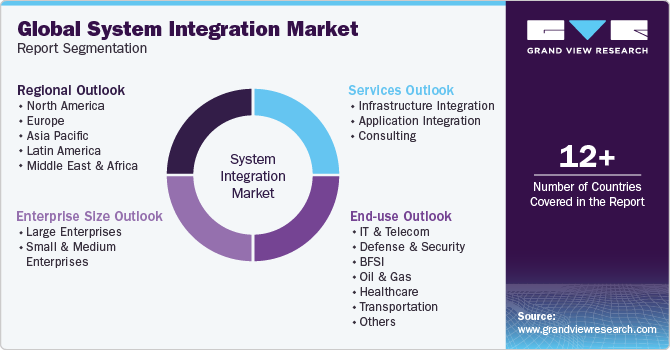
-
Services Outlook (Revenue, USD Billion, 2018 - 2030)
-
Infrastructure Integration
-
Application Integration
-
Consulting
-
-
Enterprise Size Outlook (Revenue, USD Billion, 2018 - 2030)
-
Large Enterprises
-
Small & Medium Enterprises
-
-
End-Use Outlook (Revenue, USD Billion, 2018 - 2030)
-
IT & Telecom
-
Defense & Security
-
BFSI
-
Oil & Gas
-
Healthcare
-
Transportation
-
Retail
-
Others
-
-
Regional Outlook (Revenue, USD Billion, 2018 - 2030)
-
North America
-
U.S.
-
Canada
-
-
Europe
-
Germany
-
U.K.
-
France
-
Italy
-
-
Asia Pacific
-
China
-
Japan
-
India
-
Australia
-
South Korea
-
-
Latin America
-
Brazil
-
Mexico
-
-
Middle East and Africa (MEA)
-
Saudi Arabia
-
UAE
-
South Africa
-
-
Frequently Asked Questions About This Report
b. The global system integration market size was estimated at USD 353.92 billion in 2022 and is expected to reach USD 385.95 billion in 2023.
b. The global system integration market is expected to grow at a compound annual growth rate of 13.8% from 2023 to 2030 to reach USD 955.21 billion by 2030.
b. North America dominated the system integration market with a share of over 35% in 2022. This is attributable to huge investments made by the government for the adoption of innovative solutions within various departments.
b. Some key players operating in the system integration market are Accenture, Capgemini, Fujitsu Limited, Oracle Corporation, Infosys Limited, Cisco Systems, Inc., Cognizant, Computer Sciences Corporation (CSC), Deloitte Touche Tohmatsu Limited, Hewlett Packard Company, IBM Corporation, Tata Consultancy Services Ltd., and HCL Technologies
b. The rising advancements in cloud technologies, increasing use of the Internet of Things (IoT), and rising investment in distributed information technology systems (telecommunication networks and real-time process control), are a few factors contributing to the growth of this market.
Share this report with your colleague or friend.
Need a Tailored Report?
Customize this report to your needs — add regions, segments, or data points, with 20% free customization.

ISO 9001:2015 & 27001:2022 Certified
We are GDPR and CCPA compliant! Your transaction & personal information is safe and secure. For more details, please read our privacy policy.
Trusted market insights - try a free sample
See how our reports are structured and why industry leaders rely on Grand View Research. Get a free sample or ask us to tailor this report to your needs.










